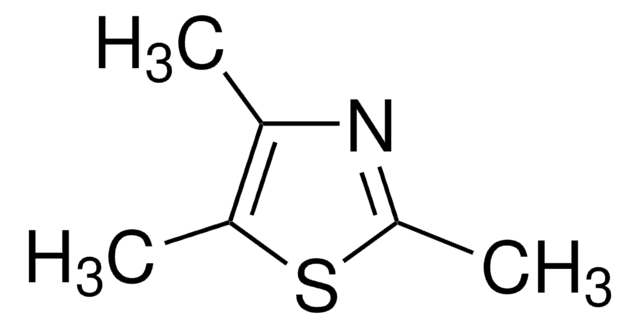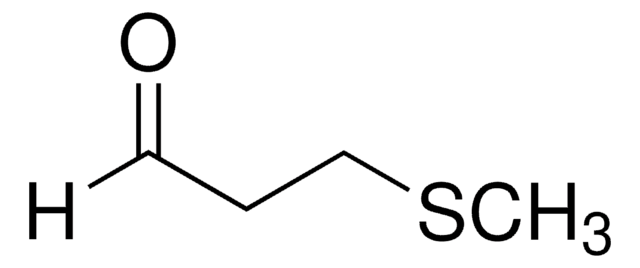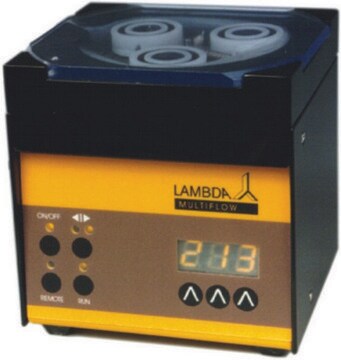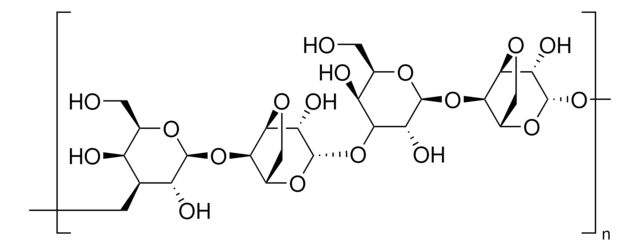Wichtige Dokumente
W332518
2,4,5-Trimethylthiazol
≥98%, FG
Synonym(e):
2,4,5-trimethyl-1,3-thiazole
About This Item
Empfohlene Produkte
Biologische Quelle
synthetic
Qualitätsniveau
Qualität
FG
Fragrance grade
Halal
Kosher
Agentur
follows IFRA guidelines
meets purity specifications of JECFA
Einhaltung gesetzlicher Vorschriften
EU Regulation 1223/2009
EU Regulation 1334/2008 & 178/2002
Assay
≥98%
Brechungsindex
n20/D 1.509 (lit.)
bp
166-167 °C/717 mmHg (lit.)
Dichte
1.013 g/mL at 25 °C (lit.)
Anwendung(en)
flavors and fragrances
Dokumentation
see Safety & Documentation for available documents
Nahrungsmittelallergen
no known allergens
Allergener Duftstoff
no known allergens
Organoleptisch
cocoa; coffee; musty; vegetable; nutty
SMILES String
Cc1nc(C)c(C)s1
InChI
1S/C6H9NS/c1-4-5(2)8-6(3)7-4/h1-3H3
InChIKey
BAMPVSWRQZNDQC-UHFFFAOYSA-N
Suchen Sie nach ähnlichen Produkten? Aufrufen Leitfaden zum Produktvergleich
Verwandte Kategorien
Allgemeine Beschreibung
Anwendung
- RIFM fragrance ingredient safety assessment, 2,4,5-trimethylthiazole, CAS Registry Number 13623-11-5.: A comprehensive safety assessment of 2,4,5-Trimethylthiazole used in fragrances, evaluating its impact on human health and the environment, underscoring its relevance in food and cosmetic industries (Api et al., 2024).
Signalwort
Danger
H-Sätze
Gefahreneinstufungen
Acute Tox. 4 Oral - Eye Dam. 1 - Flam. Liq. 3 - Skin Irrit. 2 - STOT SE 3
Zielorgane
Respiratory system
Lagerklassenschlüssel
3 - Flammable liquids
WGK
WGK 3
Flammpunkt (°F)
132.8 °F - closed cup
Flammpunkt (°C)
56 °C - closed cup
Persönliche Schutzausrüstung
Eyeshields, Faceshields, Gloves, type ABEK (EN14387) respirator filter
Hier finden Sie alle aktuellen Versionen:
Besitzen Sie dieses Produkt bereits?
In der Dokumentenbibliothek finden Sie die Dokumentation zu den Produkten, die Sie kürzlich erworben haben.
Kunden haben sich ebenfalls angesehen
Global Trade Item Number
| SKU | GTIN |
|---|---|
| W332518-100G | |
| W332518-1KG | |
| W332518-25G-K | 4061837820397 |
| W332518-SAMPLE-K | 4061837535680 |
| W332518-100G-K | 4061837535673 |
| W332518-1KG-K | 4061837820380 |
| W332518-25G | |
| W332518-SAMPLE |
Unser Team von Wissenschaftlern verfügt über Erfahrung in allen Forschungsbereichen einschließlich Life Science, Materialwissenschaften, chemischer Synthese, Chromatographie, Analytik und vielen mehr..
Setzen Sie sich mit dem technischen Dienst in Verbindung.













